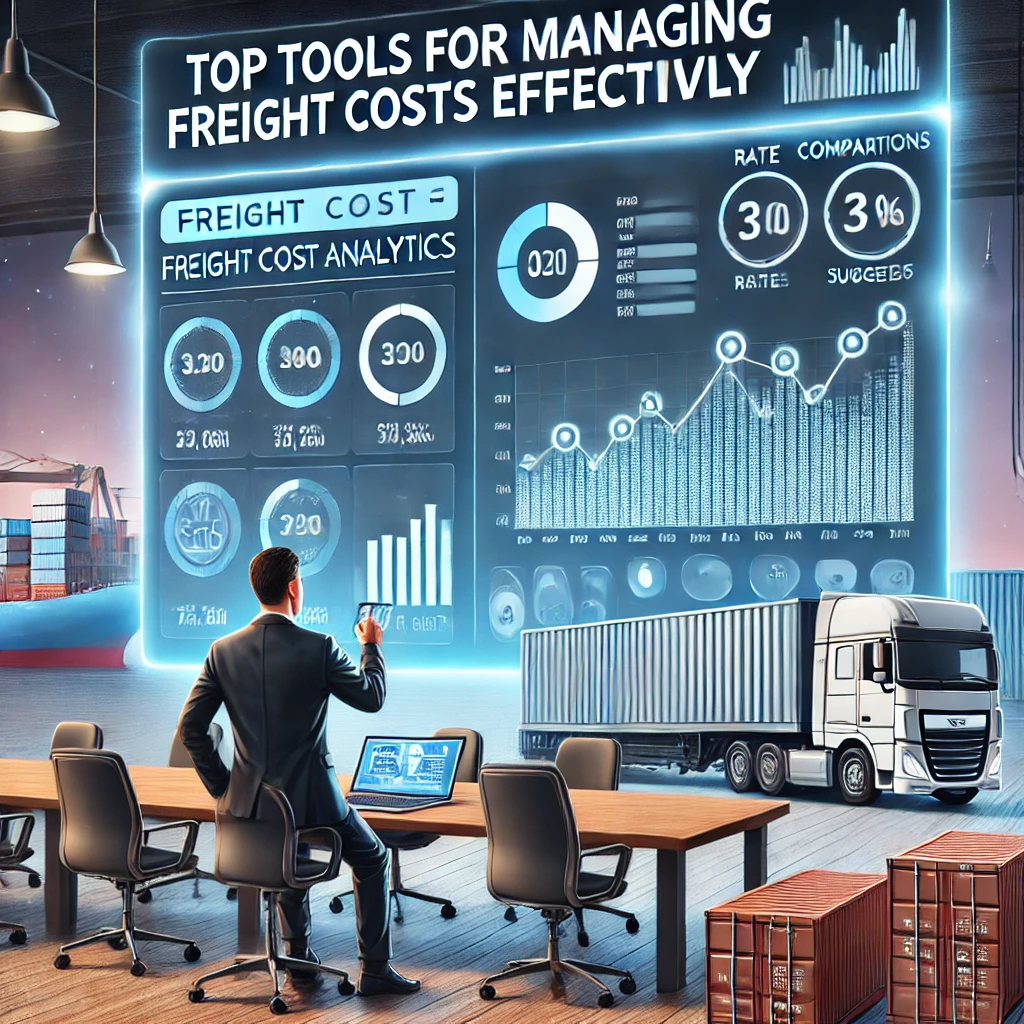Top Tools for Managing Freight Costs Effectively

Why Freight Cost Management is Essential
Managing freight costs is essential for businesses that rely on shipping goods. Here are some reasons why freight cost management should be a priority:
- Cost Control: Freight costs account for a significant portion of logistics expenses.
- Operational Efficiency: Optimizing freight costs improves overall supply chain efficiency.
- Customer Satisfaction: Reducing shipping costs can lead to competitive pricing and better customer service.
- Profitability: Lower freight costs can directly improve a company’s profit margins.
Challenges in Freight Cost Management
Businesses face several challenges when managing freight costs:
- Fluctuating Fuel Prices: Fuel costs can change rapidly, affecting shipping rates.
- Carrier Rate Changes: Different carriers have varying pricing structures, making it difficult to predict costs.
- Hidden Fees: Surcharges and hidden fees can significantly increase shipping expenses.
- Inefficient Routing: Poor route planning can lead to higher fuel consumption and longer delivery times.
- Lack of Visibility: Without real-time tracking, it’s challenging to monitor and control freight expenses.

Top Tools for Managing Freight Costs Effectively
Here are the best tools available in 2025 to help businesses manage and reduce their freight costs:
1. Linbis
Overview: Linbis is a cloud-based freight management platform that offers tools to optimize shipping routes, compare carrier rates, and track shipments in real-time.
Key Features:
- Multi-carrier rate comparison
- Automated route optimization
- Real-time shipment tracking
- Customizable reports
- Integration with accounting software
Why It Stands Out: Linbis provides comprehensive freight cost management tools with a user-friendly interface, making it suitable for businesses of all sizes.
Pricing: Contact for custom pricing.
2. FreightPOP
Overview: FreightPOP is a transportation management system (TMS) that helps businesses manage their freight expenses by comparing rates across multiple carriers and optimizing shipping routes.
Key Features:
- Multi-carrier rate comparison
- Real-time tracking
- Automated invoicing
- Reporting and analytics
- Mobile app for on-the-go access
Why It Stands Out: FreightPOP integrates with over 300 platforms, including ERPs and CRMs, making it a versatile tool for managing freight costs.
Pricing: Starts at $199 per month.
3. Descartes Transportation Management
Overview: Descartes offers a range of logistics solutions, including a transportation management system (TMS) focused on reducing freight costs through route optimization and carrier rate management.
Key Features:
- Real-time rate comparison
- Route optimization
- Invoice auditing
- Analytics and reporting
- Integration with customs compliance tools
Why It Stands Out: Descartes’ powerful analytics tools help businesses identify cost-saving opportunities.
Pricing: Contact for custom pricing.
4. Alpega TMS
Overview: Alpega TMS is a comprehensive transportation management system designed to streamline logistics operations and reduce freight costs.
Key Features:
- Multi-modal transportation management
- Real-time rate comparison
- Automated invoicing
- Analytics and reporting
- Freight audit and payment
Why It Stands Out: Alpega offers end-to-end freight management solutions, making it suitable for large enterprises.
Pricing: Contact for custom pricing.
5. Freightos
Overview: Freightos is an online freight marketplace that helps businesses compare shipping rates across different carriers and book shipments at the best prices.
Key Features:
- Instant rate comparison
- Booking and tracking
- Automated documentation
- Analytics and reporting
- Integration with ERP and CRM systems
Why It Stands Out: Freightos simplifies the process of finding the best shipping rates, making it ideal for small and medium-sized businesses.
Pricing: Contact for custom pricing.
6. Shipwell
Overview: Shipwell is a transportation management platform that combines freight management, real-time tracking, and analytics to help businesses reduce their shipping costs.
Key Features:
- Multi-carrier rate comparison
- Real-time tracking
- Automated invoicing
- Analytics and reporting
- Integration with warehouse management systems
Why It Stands Out: Shipwell’s AI-driven insights help businesses identify cost-saving opportunities in their supply chain.
Pricing: Contact for custom pricing.
Key Features to Look for in Freight Cost Management Tools
When selecting a tool for managing freight costs, consider the following key features:
- Rate Comparison: The tool should allow you to compare rates across multiple carriers.
- Route Optimization: Look for tools that optimize shipping routes to reduce fuel costs and delivery times.
- Invoice Auditing: Automated invoice auditing can help identify discrepancies and avoid overcharges.
- Real-Time Tracking: Visibility into shipments helps control costs and improve customer satisfaction.
- Analytics and Reporting: Data-driven insights can help identify areas for cost reduction.

Benefits of Using Freight Cost Management Tools
- Cost Savings: Identify the most cost-effective carriers and routes.
- Improved Efficiency: Automate manual processes and reduce administrative tasks.
- Enhanced Visibility: Real-time tracking and reporting improve transparency.
- Better Decision-Making: Analytics tools provide insights to help optimize freight operations.
- Scalability: As your business grows, these tools can adapt to handle more shipments and carriers.
How to Choose the Right Freight Cost Management Tool
When choosing a freight cost management tool, consider the following factors:
- Business Size and Needs: Ensure the tool can handle your shipment volume and specific requirements.
- Integration: Look for tools that integrate with your existing systems, such as accounting software and CRMs.
- User-Friendliness: The tool should be easy to use and require minimal training.
- Customer Support: Choose a provider with reliable customer support to assist with any issues.
- Scalability: Ensure the tool can grow with your business.

Technological Trends Shaping Freight Cost Management in 2025
- AI and Machine Learning: These technologies help predict shipping rates, optimize routes, and automate cost-saving strategies.
- Blockchain Technology: Enhances transparency and security in freight transactions.
- Mobile Accessibility: More tools offer mobile apps for managing freight costs on the go.
- Sustainability: Tools are focusing on reducing carbon emissions and promoting greener shipping practices.
Conclusion
Managing freight costs effectively is essential for businesses to remain competitive in the logistics industry. By leveraging tools like Linbis, FreightPOP, and Descartes, companies can optimize their shipping operations, reduce costs, and improve customer satisfaction. When choosing a freight cost management tool, consider your business’s specific needs, scalability requirements, and budget to find the best solution.
